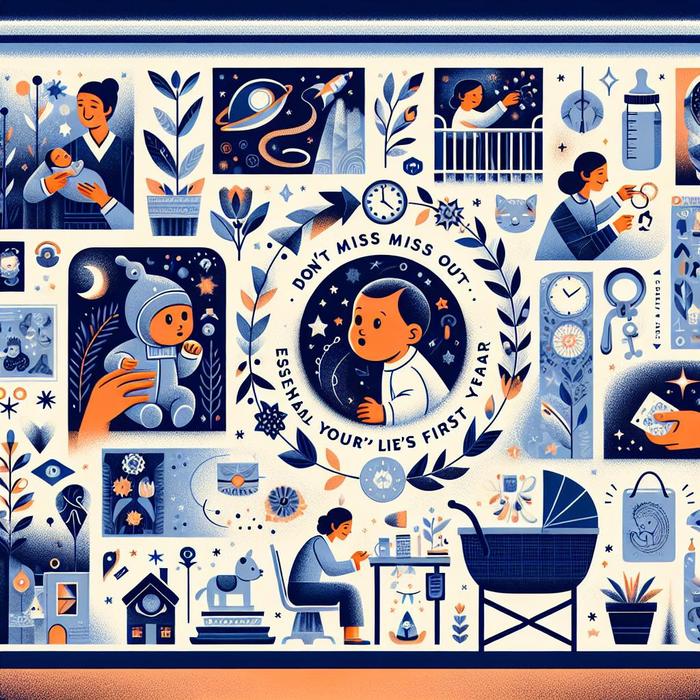Understanding the Significance of Baby Milestones
When it comes to parenthood, observing your baby’s milestones is one of the most exciting parts. However, it’s more than just a series of ‘firsts.’ The developmental milestones your baby goes through during their first year are indicators of their overall health and well-being. These milestones are not only valuable in understanding your baby’s progression but also provide insight for your pediatrician’s assessments during routine visits.
Routine pediatric visits are vital to monitoring your baby’s growth and development. Understanding what milestones to expect at different stages can help prepare you for these visits and enable you to discuss your baby’s progress with confidence.
Crucial First Year Milestones
From their initial smile to their first step, your baby’s first year essentials involve numerous skills and developments. Here are a few significant milestones your baby will likely reach during their first year:
- Smiling: One of the first milestones your little one will achieve is their first real smile. This heartwarming moment usually happens between 6-12 weeks.
- Rolling over: Babies typically begin to roll over between 3-6 months of age. This is a major step towards more active movements like crawling and walking.
- Sitting up: Sitting up without support is a great strength-building exercise and is usually achieved around 6-9 months.
- First words: Although it may be just a simple ‘mama’ or ‘dada,’ your baby’s first words are a key developmental milestone, typically happening around 9-12 months.
These are just a few examples. Each baby’s journey is unique, and they may reach these milestones at their own pace. If you want to learn more about the typical development timeline, this resource from Cleveland Clinic provides a week-by-week guide.
Creating a Nurturing Environment for Your Baby’s Development
As parents, you play a crucial role in facilitating your baby’s growth and development. There are several ways you can actively contribute to your baby’s developmental journey.
Creating a conducive environment is crucial for your little one’s learning. Setting up the perfect nursery can be a good starting point in providing a safe and stimulating space for them.
Play is another critical aspect of baby’s development. Engaging your baby in a variety of developmentally appropriate play activities can aid in their cognitive, physical, and emotional growth.
Recognizing Delays in Baby’s Milestones
While it’s important to celebrate your baby’s achievements, it’s equally crucial to be aware of any potential delays in their developmental milestones. Not reaching these milestones at the expected age is not always a cause for concern, but it’s always best to consult a healthcare professional if you’re worried. The CDC’s milestones tracker can be a valuable tool in this regard.
To learn more about what to expect during your baby’s first year and how they relate to your child’s development, explore resources like the MI Kids Matter. This guide provides a comprehensive overview of a baby’s first year, ensuring you don’t miss out on any important milestones.
Beneficial Activities for Baby’s Growth and Development
While it’s essential to provide a safe, nurturing environment, there are several proactive strategies parents can implement to facilitate their baby’s natural development. WebMD suggests some practical activities for different developmental stages:
- Reading aloud: This activity encourages cognitive development by developing listening skills, memory, and vocabulary. From colourful picture books to tactile interactive books, reading aloud helps you bond with your baby and initiates their lifelong learning journey.
- Tummy time: This is the process of placing your baby on their belly while they are awake and supervised. It strengthens their neck, shoulder, and torso muscles, and helps develop motor skills essential for milestones like rolling over, sitting up and crawling.
- Playing with toys: Encouraging your baby to reach for toys, roll a ball, or stack blocks helps develop grasping skills, hand-eye coordination, and promotes understanding of cause and effect.
Remember to keep it fun and interactive, and adjust the activities based on your baby’s interest, temperament, and developmental pace.
Understanding the Possible Reasons for Delays
Deviation from the prescribed timelines for developmental milestones can sometimes trigger anxiety among parents. While each child develops at a different pace, it’s important to note that consistent delays might indicate underlying health or developmental conditions such as Autism Spectrum Disorder or motor-neurological disorders.
This article on WebMD provides useful insights into possible reasons for developmental delays and stresses the importance of early intervention. Remember, early detection and tailored interventions can have a significant impact on your child’s development, so don’t hesitate to discuss any concerns with your healthcare provider.
Maintaining Regular Communication with Your Pediatrician
To optimally monitor your baby’s growth, it’s crucial to maintain regular communication with your healthcare provider. Keeping them in the loop about your baby’s progress or any concerns you might have can facilitate a prompt response and tailored advice.
Furthermore, you may also find value in joining parenting communities and parental support platforms such as March of Dimes to share experiences with other parents, ask questions, and to gain a sense of community.
The Joy in Celebrating Baby Milestones
As a parent, it’s easy to get caught up in our worry and the desire to provide the best for our child. In observing and charting our baby’s development, we should not forget the unique joy and amazement of observing each new skill learned. Each giggle, babble, and crawl is a testament to your baby’s resilience and an affirmation of your nurturing care. So, enjoy your baby’s growth, celebrate each milestone, and cherish these fleeting moments.
For an in-depth timeline of milestones and a detailed review of baby development, you may find this benchmark chart from The Bump beneficial, as it provides a comprehensive and visually engaging guide to your child’s first year.

